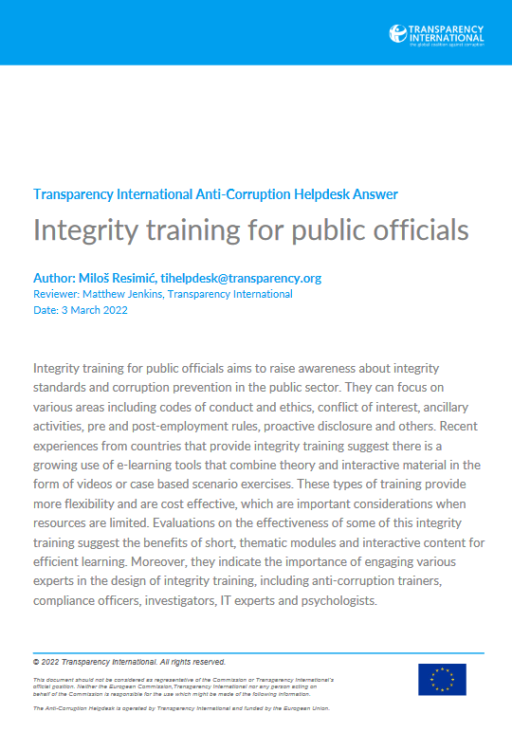
This Anti-Corruption Helpdesk brief was produced in response to a query from one of Transparency International’s national chapters. The Anti-Corruption Helpdesk is operated by Transparency International and funded by the European Union.
Query
Please provide an overview of international examples/best practices on awareness raising for civil servants and government officials on issues of integrity and anti-corruption.
Summary
Integrity training for public officials aims to raise awareness about integrity standards and corruption prevention in the public sector. They can focus on various areas including codes of conduct and ethics, conflict of interest, ancillary activities, pre and post-employment rules, proactive disclosure and others. Recent experiences from countries that provide integrity training suggest there is a growing use of e-learning tools that combine theory and interactive material in the form of videos or case based scenario exercises. These types of training provide more flexibility and are cost effective, which are important considerations when resources are limited. Evaluations on the effectiveness of some of this integrity training suggest the benefits of short, thematic modules and interactive content for efficient learning. Moreover, they indicate the importance of engaging various experts in the design of integrity training, including anti-corruption trainers, compliance officers, investigators, IT experts and psychologists.
Contents
- Introduction
- Areas of integrity training for public officials
- Codes of ethics and codes of conduct
- Conflict of interest rules and procedures
- Pre and post-employment rules
- Receipt of gifts
- Avoiding nepotism
- Income and asset disclosure
- Supporting an open organisational culture
- Transparency in lobbying
- Ancillary activities
- Proactive disclosure / transparency measures / dealing with freedom of information requests
- Integrity training for public officials: design considerations
- Integrity training for public officials: examples of existing practices
- Austria
- Estonia
- Poland
- Slovak Republic
- Other relevant examples
Main points
- Integrity training for public officials aims to raise awareness to existing integrity standards and anti-corruption.
- This training can cover various areas, such as codes of conduct and ethics, conflict of interest, asset and income disclosure, ancillary activities, lobbying transparency and others.
- Recent practice suggests a widespread use of online training due to its flexibility and cost-effectiveness, which combine theoretical information, videos and interactive case scenario exercises.
- Existing countries’ experiences suggest increased effectiveness from combining theory and practical case examples.
- Evaluations of this training in some countries suggest the benefits of short, thematic modules and interactive tools.
- The engagement of various experts –such as anti-corruption trainers, compliance officers, IT experts and psychologists – in designing integrity training has also shown to be beneficial.
Authors
Miloš Resimić, [email protected]
Reviewers
Reviewer:
Matthew Jenkins, Transparency International
Date
30/03/2022

